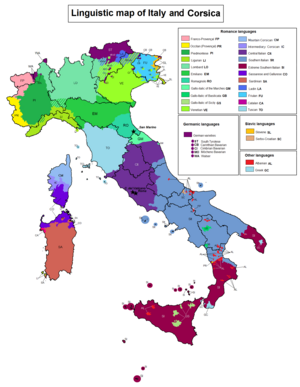Gallo-Italian languages
| Gallo-Italic | |
|---|---|
| Gallo-Italian | |
| Geographic distribution: |
Italy, San Marino, Switzerland, Monaco, France |
| Linguistic classification: |
Indo-European
|
| Subdivisions: | |
| Glottolog: | gall1279 |

Gallo-Italic in various shades of green
|
|
The Gallo-Italian or Gallo-Italic languages constitute the majority of the languages of northern Italy. They are Piedmontese, Lombard, Emilian-Romagnol and Ligurian, although there is some doubt about the position of the latter due to a number of special characteristics. The Venetian language is usually considered one of the Italo-Dalmatian languages; however, some publications define it as Gallo-Italian.
The Gallo-Italian languages have characteristics both of the Gallo-Romance languages to the northwest (including French and Occitan) and the Italo-Dalmatian languages to the south (including Italian). Examples of the former are the loss of all final vowels other than -a; the occurrence of lenition; the development of original /kt/ to /jt/ (and often later to /tʃ/); and the development of front rounded vowels (e.g. the change of /u/ to /y/). Examples of the latter are the use of vowel changes to indicate plurals, in place of /s/; the widespread occurrence of metaphony of stressed vowels, triggered by original final /i/; and the development in some areas of /tʃ/ instead of /ts/ as the result of palatalisation of original /k/ before e and i.
As a result, there is some debate over the proper grouping of the Gallo-Italian languages. They are sometimes grouped with Gallo-Romance, but other linguists group them in Italo-Dalmatian.
...
Wikipedia
